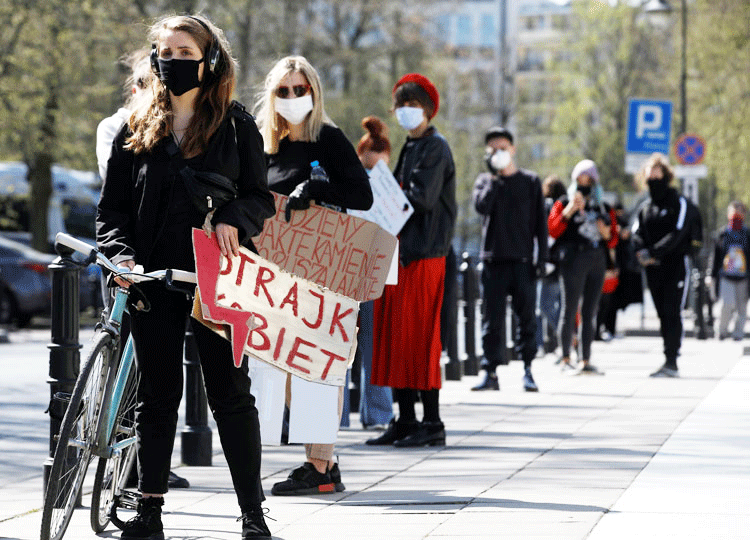The protest line was long across the street from the parliament building in Warsaw, Poland’s capital, April 15. Most of those lined up were women dressed in black from head to foot. They all wore face masks and stood six feet apart. Some carried posters and held banners. On their clothing, bags, banners and posters they sported lightning bolts, clothes hangers, umbrellas and clenched fists, all symbols familiar from actions in defense of women’s right to choose abortion.
On the opposite side of the street the parliament was debating a law that would totally ban abortion. This was the legislators’ third attempt to adopt the bill. They failed in both 2016 and 2018 when tens of thousands took to the streets in protest. With the country in a lockdown blamed on the coronavirus, they thought they could get away with it this time.
“It’s a draconian law against women,” Krystyna Kacpura, executive director of the Federation for Women and Family Planning, told the Militant by phone from Warsaw April 27. “It deprives us of abortion rights and they’re trying to do it in a time when we are deprived of the right to protest. We would have come out in demonstrations, like we did when they tried before. So we had to find other ways.”
The day before the April 15 action, fighters for women’s rights headed to the intersection of Warsaw’s two main boulevards in cars and on bicycles. At noon drivers stopped their cars, blocking traffic, while shouting slogans and honking horns. Cyclists in black on bikes adorned with banners circled the roundabout. Police shouted that the assembly was illegal, ordering people to go home. Cops issued fines to 100 people.
“We joined the lines outside grocery and other stores. We hung signs and banners in windows and on balconies,” Kacpura said. “We sent 2.8 million letters to members of parliament and hundreds of tweets daily leading up to the debate, which was outrageous. They called us murderers and used other hate language. We will protest this.”
Legislators didn’t vote on the bill. Instead they sent it to a parliamentary commission. Kacpura says that the government will definitely come back and try again.
Abortion was criminalized in 1993 with some exceptions. The new law would ban abortions in cases of fetuses with serious abnormalities, the grounds for 95% of all legal abortions today, which number from 1,000 to 2,000 a year. Back alley abortions are estimated to be anywhere from 10,000 to 150,000.
The “morning after” pill used to be available over the counter. Now it requires a prescription. Doctors can use a legal “conscience clause” to refuse to prescribe birth control, and pharmacists often refuse to dispense contraceptives.
Another proposed new law criminalizes providing information on sex, contraception or abortion to youths under 18, enforced by prison terms of up to three years if convicted. This would effectively ban what little is left of sex education in schools.
Women organize to fight back
When the draconian anti-abortion bill was introduced in 2016, 150,000 people dressed in black hit the streets in “Black Monday” demonstrations that October. There were rallies in 140 cities, towns and villages across Poland. Popular slogans were “A woman is a human being” and “My body, my choice.”
“That bill would have meant a total ban, no sexual education, no contraception, no abortion,” Kacpura said. “Women were furious. Most of the protests were in small towns and rural areas. We have the support of women there. The government had to back off.”
When the bill was raised again in 2018, more mass actions exploded, and the bill died.
When abortion was legalized bureaucratically by Poland’s Stalinist rulers in 1956, it wasn’t as a right of a woman to control her own body. And it wasn’t the result of a big struggle by women. As in the Soviet Union, despite Poland being largely Catholic, abortion became the principal means of birth control in a country with little contraception available. In 1962 alone, some 400,000 abortions were performed.
After the overthrow of the Stalinist regime in a wave of workers’ struggles in the late 1980s, pro-capitalist forces became dominant and, along with other social changes, abortion was criminalized.
After 1956, women went to Poland from other countries in Europe where the procedure had been criminalized. Now the travel goes in the opposite direction.
How come Poland went from total access to a nearly total ban in such a short time?
“Women had taken abortion for granted. We were used to thinking only about ourselves and there was no solidarity,” Kacpura said. “Then in the early 1990s with the coming down of the Berlin Wall, we won democratic rights, which was very important. But we took this hit. For the next 25 years Polish women were asleep. With 2016 this changed. It showed us what it takes and how it needs to be done. We are now acting on that lesson.”


